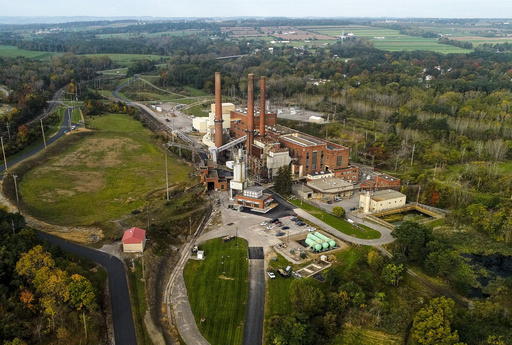A cryptocurrency facility located in central New York has obtained permission to keep functioning following a court ruling that dismissed state efforts to close down the plant over its environmental impact.
The ruling was celebrated as a significant win for Greenidge Generation, a prominent crypto mining operation situated in the Finger Lakes, which has faced criticism from environmental advocates and regulatory bodies since it initiated bitcoin mining four years ago.
Similar to many large-scale crypto-mining sites, Greenidge operates thousands of energy-intensive computer servers that produce bitcoin by solving intricate algorithms. The facility derives its energy from a once-defunct coal-fired power plant that transitioned to natural gas in 2017.
In 2022, the New York Department of Environmental Conservation (DEC) turned down the necessary air permit for the plant, asserting that its emissions were inconsistent with the state’s robust climate objectives.
Responding to a lawsuit filed by Greenidge, State Supreme Court Justice Vincent M. Dinolfo ruled that the DEC had not allowed the company a chance to explain its alleged infractions, referring to this misstep as an “interpretative error” within the legal framework.
“Today, transparent political bias was defeated,” Greenidge remarked in an official statement. “This ruling guarantees that our facility can keep running, allowing our local workforce to maintain their livelihoods, unaffected by government overreach driven by politically charged motives without any lawful foundation.”
In contrast, a coalition of environmental organizations asserts that Greenidge is releasing millions of pounds of carbon dioxide into the atmosphere and polluting nearby Seneca Lake with the daily heated water discharge necessary for the facility’s operation.
“The community around Finger Lakes has been alerting authorities regarding the detrimental effects of this facility on their air, water, and climate,” commented Mandy DeRoche, a deputy managing attorney for Earthjustice’s Clean Energy Program. “We will persist in our battle until Greenidge is permanently closed.”
In its permit denial, the DEC accused the plant of misleading regulators regarding the real intent behind its conversion. “Instead of addressing the state’s current electricity demands as initially claimed, the facility is primarily operating to fulfill its own substantial new energy requirements,” the agency articulated in its correspondence to the company.
A representative from the DEC has yet to respond to inquiries related to the ruling.
Greenidge has maintained that it complies with all of its permits and claims its operations are entirely carbon neutral, attributing this status to the acquisition of carbon offsets, such as forestry initiatives and projects that capture methane from landfills.
Yvonne Taylor, a vice president at Seneca Lake Guardian, noted that this facility represents a crucial benchmark for the state’s ability to apply its climate legislation. She expressed concern that the recent election of Donald Trump, who has received substantial financial backing from the cryptocurrency sector, could undermine efforts to impose such environmental protections.
“The allowance for Greenidge to continue functioning contradicts our state’s climate ambitions and the generations of work put into it by our community,” Taylor pointed out. “It serves no public interest or benefit, except enriching a select group of already affluent individuals.”



